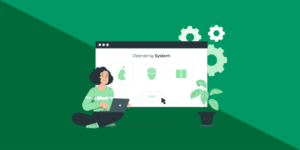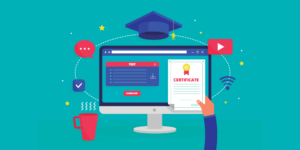Online Learning vs Proctored Testing How Do They Differ?
Education has changed fast in our modern time. Old style learning rooms are now being shifted, or in some cases, added to using web courses and checking tests where students have to follow rules. Both the online courses and the proctored tests have the same end in mind of seeing if students are learning and if they are better at what they know, but they are still very different in how they look, what they were made to do, and how they work.
Online learning is about being able to learn and grow as you see fit, whereas proctored testing is about making sure one can do what they should – confidently and when they need to be sure they are doing well. What makes them different really is all about the fact they can each make sure they are doing good at what is learned best and in what would make most sense. This is very important for students, teachers, and leaders where education is key in a world with more use of machines.
This detailed review looks at the basic things about how online learning and proctored testing are different, what they are used for, how they help, how they are a challenge, and what they could be used for in the years to come for learning around the world.
What You Need to Know About Online Learning
Online learning, known as e-learning or virtual education, is simple. Students can learn and get big ideas on high tech places. They can study from anywhere with help from videos, tests, online ways to learn, and places to share and to talk. Many students in a nursing school and doing other important work look into good help in school to pay someone to take my online nursing exam for me without any risks and safely and well while being sure they always move forward in learning.
Key Characteristics of Online Learning
- Flexibility: Students are free to learn whenever they want and in their preferred time.
- Accessibility: Courses from world-class schools are open to anyone who has the Internet.
- Engagement Tools: Knowledge is better through multimedia, being entertaining, and if it can be inserted with items where people respond.
- Continuous Learning: Lessons may be learned again, practice tests may be taken, and one may get prompt feedback.
Benefits of Online Learning
The educational world has been changed by online learning. There are no geographic limits to online learning plus it brought trendy new learning systems. Here are some of the gains:
- Learning paths tailored to each student’s grades.
- Can reach worldwide teachers and tools.
- Much less than classic forms of learning.
- A free to follow way of learning that also makes people learn responsibility and discipline.
Yet, motivation and self-control are the requirements of this approach because students have to learn alone often.
What Is Proctored Testing?
Proctored testing is one kind of controlled test to make sure people take online tests honestly and with integrity. When students take them, a proctor, which could be human or AI, watches them through webcams, microphones, and screen-sharing systems to stop bad habits. Many students seek expert academic guidance or professional support services to help them prepare or take my online proctored exam for me efficiently and confidently, ensuring they meet all exam requirements ethically and successfully.
Types of Proctored Tests
- Live Proctoring: A real human monitors the test in real time.
- Automated Proctoring: AI algorithms track movements, voice, and screen activity to detect suspicious behavior.
- Recorded Proctoring: The entire exam session is recorded for later review.
Purpose of Proctored Testing
The most important thing is to make sure students are honest and fair during online tests. This what it does, that becomes a digital way of giving students a feel of a standard examination. Students have to walk while they take the test, without any outside help or cheating.
The Core Differences Between Online Learning and Proctored Testing
While both systems are part of the modern education ecosystem, they serve different purposes.
| Aspect | Online Learning | Proctored Testing |
| Purpose | Knowledge acquisition and skill development | Evaluation and verification of learning |
| Environment | Flexible and self-paced | Strictly controlled and monitored |
| Tools Used | Learning Management Systems (LMS), video lessons | Proctoring software, monitoring systems |
| Student Role | Active learner | Test-taker following rules |
| Instructor Role | Guide and facilitator | Evaluator or supervisor |
| Stress Level | Generally low | Often high due to supervision |
Both systems complement each other—one teaches, the other validates. Together, they ensure both learning quality and academic integrity.
How Online Learning Prepares Students for Proctored Exams
Most students do not understand how external factors in online environments can quickly and easily harm students’ test scores. Still, online learning offers important skills that help deal with these issues. Students preparing to take PMP exam online can especially learn how to use time well, have clear thoughts and stay flexible to learn new skills—all can help in taking good tests as well as feeling better about the tests.
Preparation Advantages
- Familiarity with Digital Tools: Students who attend online classes are already used to digital interfaces, webcams, and quizzes.
- Exposure to Online Assessments: Frequent quizzes mimic real exam patterns, reducing anxiety.
- Improved Self-Discipline: Independent study habits developed during online learning help in timed tests.
- Access to Recorded Lectures: Enables thorough revision before proctored exams.
Online education is therefore not just about convenience—it’s also strategic preparation for a monitored testing environment.
Challenges of Online Learning
While online learning offers numerous benefits, it also presents challenges that can affect student performance and motivation.
Common Challenges
- Distractions at Home: Lack of a structured environment can lead to procrastination.
- Technical Issues: Poor internet or outdated hardware may interrupt lessons.
- Limited Interaction: Students may feel isolated without face-to-face engagement.
- Authenticity Concerns: Academic integrity can be harder to maintain.
Possible Solutions
- Create a dedicated study space free from distractions.
- Use stable internet and updated learning devices.
- Engage in online discussions and peer groups for interaction.
- Follow institutional honor codes to maintain ethics.
These measures ensure that online learning remains productive, ethical, and effective.
The Role of Proctoring in Academic Integrity
The strongest point for proctored tests is their role in making school tough to cheat using the internet. Proctoring makes sure each student has an equal chance to do well when taking an exam online.
Why Proctoring Matters
- Detects cheating, wrong notes, and other voices.
- Finds where students are looking through eye and face work.
- Gives faith to colleges and businesses about the worth of Internet degrees.
Again, students might be afraid to have their activities monitored by the computer.
Student Experience: Comfort vs. Control
The student experience varies drastically between online learning and proctored testing.
Online Learning Experience
Students appreciate:
- Self-rule and hours of studying are flexible.
- Cool with me if I can pause from what I am learning.
- Make me comfortable to learn without any stress.
Proctored Testing Experience
Students often face:
- Tight control, high force.
- Obtrusive technical stop.
- Fear of technical problems or AI errors.
It is important that there is a mix of ease and solving is the right way of providing services, and that learners will want them.
Also Read This Blog: How Digital Learning Platforms Are Changing Exam Preparation
How Technology Bridges Both Systems
Technology bridges online learning and proctored testing. Current Learning Management Systems (LMS) build into one place learning and testing tools.
Examples of Integration
- LMS platforms like Canvas, Moodle, and Blackboard can now take the class and monitor exams.
- AI formulas look at how well students are doing and if they are ready for tests.
- systems like Examity or ProctorU work well with learning portals.
This merging makes sure that there is a full way to teach and gauge learning, so there will be no problem in the flow of school activities.
Ensuring Security and Privacy in Proctored Exams
Proctored tests rely on security to work. Schools need advice that will help them keep data safe while also promoting honest study habits.
Best Practices for Secure Online Testing
- Use privacy proctoring arrangements that follow GDPR and FERPA rules.
- Tell students about what monitoring will be used beforehand.
- Have a process where only some people can access recordings.
- Help students with any tech problem that might happen.
Transparency is crucial—students perform better when they trust the process.
Future of Online Learning and Proctored Testing
The future is moving toward advanced models where online learning integrates real-time supervision, interactive teaching, and instant grading. Technologies like Artificial Intelligence, Virtual Reality (VR), and digital certification will reshape education. For students balancing work, studies, or personal commitments, choosing to hire someone to do my exam through trusted academic consultancy services may also become part of this evolving educational landscape—ensuring support while maintaining learning quality and integrity.
Predicted Trends
- AI Tutors and Smart Proctors: Systems that use AI to change with students’ speed of learning and identify quicker when someone steals.
- Virtual Classrooms with Proctored Features: Real-time tracking joined up with web based teaching.
- Skill-Based Assessments: Memorization should not be the focus; instead, application should be the focus.
- Credential Verification: Certificates cannot be changed with help from blockchain tech.
These systems will work together to give us the next level of reliable, easy-to-get education.
Key Takeaways
To summarize the main distinctions and implications:
- Online Learning comes with creating knowledge and being able to adapt.
- Proctored Testing provides fair assessment and honesty.
- Using either or both of the methods results in pace of learning.
- Technology keeps making what people do better and faster, helping both the testing and learning process.
Tips for Students Navigating Both Systems
Here are actionable tips for students balancing online learning and proctored tests:
Before the Course
- Help design a distraction free place to study.
- Know how to get around your LMS and exam program.
- Create a study plan that can be done.
During Online Learning
- Always write notes and get involved in talks.
- Make use of online tools like online simulators and flashcards.
- Revisit the quizzes done previously and practice for exams.
Before a Proctored Exam
- Ensure your internet connection and webcam work.
- Have a student I.D. and allow resources with you.
- Stay calm and follow the rules of the exam carefully.
After the Exam
- Check on how well you did on tests.
- Get help to know where you are weak.
- Think about how much you learn online.
Conclusion
Comparing tests without supervision with online learning shows two parts of the same need in school. While online learning gives students easy access, they can learn on their own time and from anywhere, supervised testing makes sure what is learned is real and graded properly.
Both are part of one very important need for online school to be worth something and to work well. As new tools are these days both will become more and more linked, which will make students smarter and the school more blended and it will still give students choice for the first and fairness of both.
FAQs About Online Learning vs. Proctored Testing
1. What is the main difference between online learning and proctored testing?
Online learning deals with getting knowledge from a web based source that offers you control in how fast or slow you go while studying. Testing that is monitored is meant to check if learning can be done under strict rules so that one cannot cheat or favor one over the other.
2. How does online learning benefit students compared to traditional classrooms?
Online learning gives people choices, ability to get to the content, and learn a lot of way. Students may learn any time, learn from teachers anywhere in the world, and learn how fast they want, which is good for workers or students who learn from wherever.
3. What is the purpose of a proctored exam?
A proctored exam makes sure students take tests while being watched — through a real person or with software. The watch keeps from cheating, makes sure the students are who they say they are, and keeps online tests fair.
4. Are proctored exams secure and private?
Yes. The majority of places employ encrypted proctoring software that is privacy compliant (ex. GDPR, FERPA). Students know before receiving the code exactly what data the software will take, and the recordings are safe and only usable by authorized individuals.
5. Can online learning prepare students for proctored exams?
Yes Absolutely. Students learn how to work with computers, test screens, and how to spread out their time. The students take tests on the computer all the time and have mock tests which help them not get scared and get stronger and learn more, which help them when they have to take real tests.
6. What are the different types of proctored testing?
There are three main types:
- Live Proctoring: A human invigilator supervises the exam in real time.
- Automated Proctoring: AI software detects suspicious movements or sounds.
- Recorded Proctoring: The session is recorded and reviewed later for violations.
7. What challenges do students face in online learning?
Some common challenges include:
- Difficulty staying motivated without physical supervision.
- Internet connectivity issues or technical glitches.
- Limited interaction with instructors and peers.
- Maintaining academic integrity without monitoring.
With proper planning and self-discipline, these issues can be effectively managed.
8. Is proctored testing stressful for students?
It could be. A lot of students face performance stress when they are always watched over. Still, when one gets ready, has drills with fake exams and gets used to the testing system, it can greatly bring down the levels of the stress.
9. How do institutions balance technology and student comfort in online exams?
Today, modern institutions make safe tools for on-line tests that have good help, and tell students openly how they check them. This makes students trust the system and be safe in the test, and it makes sure they follow the rules of the exam.
10. What does the future hold for online learning and proctored testing?
The future will have systems that blend self and social learning and have safe assessments. Future tech such as AI tutors, VR classrooms, and blockchain certificates will make online learning more engaging, valid, and relevant to all around the world.







